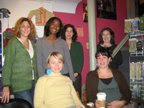Would y'all please stop buying knitting books you haven't read?
I mean, this isn't Barnes and Noble, where they'd really prefer you not read the latest Patricia Cornwell before deciding to invest.
Some people read book reviews, but most people walk into a bookstore and buy a book because it "looks good": nice cover design, interesting flyleaf copy, encouraging blurbs on the back. Maybe a quick glance at one random page to "taste" the prose.
You buy the book, you go home (or to the beach), you read the book. You like it or you don't, but if you don't, you still understand that that's part of the deal: you've bought a pig in a poke, as it were, and you won't know whether it was "worth it" until afterward.
Now, about knitting books. Totally different story. You know what's inside, because you've looked inside. There are patterns in there, for making the things in the pictures. Very few of us will read the knitting book the same way we'd read the novel. The value of the book is not in the reading experience.
Where, then, is it?
Please ask yourself, as you consider buying a knitting book, not "Is this a good book?" but rather "What is this book good for?"
Consider the possibilities:
One might buy a book in order to learn a technique. All beginners' how-to books fall into this category.
Some books are for inspiration. How many Kaffe Fassett books did you buy before you acknowledged that you weren't really going to knit that many of the things in them? That doesn't mean you regret buying them. They're beautiful, they inspire you, they expand your (my) sense of what knitting can be.
Everyone needs a couple reference books. You won't need all the information in the Big Book of Knitting, and you won't try all the stitches in the Barbara Walker Treasuries, but they're still good to have.
I want to make that sweater. By far the largest category, at least right now, is the pattern book: it's full of specific projects the way a cookbook is full of recipes. This is the category where I have an issue.
The beauty part of the knitting pattern book is that, with some close inspection, you can totally tell whether it's going to be what you want. You can read the sizing information and see whether the garments will fit you. You can read the gauge information and see if most of the projects are on teeny-tiny needles. You can read through the instructions themselves, and see whether most of them make sense or whether the whole thing looks like Sanskrit.
Yes, there are some things you can't tell for sure: will that shape be flattering on you? Is the book full of typos, so that the numbers in some of the patterns don't add up right? Are many of the yarns discontinued? (Like that matters.)
But, allowing for the cookbook factor (no one ever really expects what they cook to look like the picture in the book, do they?), there's almost no reason to buy a knitting book and be disappointed with it. And if you are disappointed with it, there's almost no one to blame but yourself.
Tomorrow: Who to blame when you're disappointed with a book before you buy it.
Subscribe to:
Post Comments (Atom)



2 comments:
Lisa, tell me more, soon, please. This is a great topic.
I'm interested today especially, because I revisited a book I didn't buy (Knitting Sutra) when I read the author's obit in The Times today.
I decided not to buy it again.
BUT, recently I bought Teva Durham's book, which I wasn't initially sure of, and now find I LOVE.
Susan Lydon died? This is tough: I always feel bad when people whose work I didn't love die. It doesn't change how I feel about the work, but it makes me feel so petty to still think, "Gee, this might have been a nice pattern if she'd set in the sleeve."
But when I first started talking to Running Press about The Joy of Knitting, one of my explicit models was The Knitting Sutra: as in, "Like The Knitting Sutra, only more intellectually rigorous and turned more outward." (I've edited the phrasing a little. I really didn't love the book.)
More soon.
Post a Comment